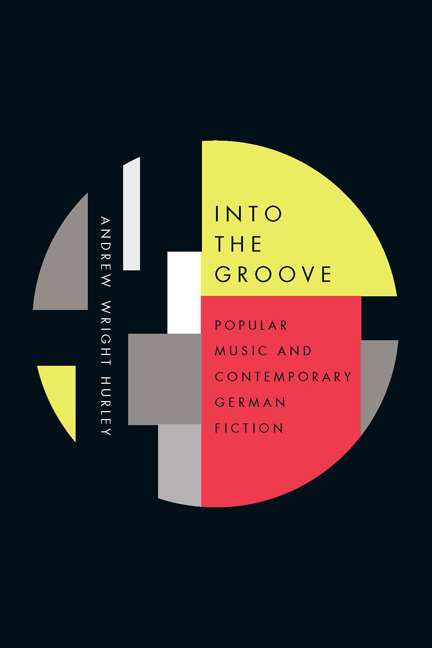Book contents
- Frontmatter
- Dedication
- Contents
- Acknowledgments
- Introduction
- 1 Preludes and Returns: Popular Music, the ʿ68 Generation, and the Literarization of the Jukebox
- 2 Enter the Double Agent: The German Popular Musician as Novelist
- 3 Techno-Lit: Electronica and Its Impacts on Fiction
- 4 Analogue is Better: Rock- and Pop-centric Literature
- 5 After the GDR's “Musical Niche Society”? Popular Music in the Literature of Thomas Brussig
- 6 The Gendering of Popular Music in the Novels of Karen Duve and Kerstin Grether
- Conclusion: Out of the Groove?
- Bibliography
- Index
3 - Techno-Lit: Electronica and Its Impacts on Fiction
Published online by Cambridge University Press: 05 May 2015
- Frontmatter
- Dedication
- Contents
- Acknowledgments
- Introduction
- 1 Preludes and Returns: Popular Music, the ʿ68 Generation, and the Literarization of the Jukebox
- 2 Enter the Double Agent: The German Popular Musician as Novelist
- 3 Techno-Lit: Electronica and Its Impacts on Fiction
- 4 Analogue is Better: Rock- and Pop-centric Literature
- 5 After the GDR's “Musical Niche Society”? Popular Music in the Literature of Thomas Brussig
- 6 The Gendering of Popular Music in the Novels of Karen Duve and Kerstin Grether
- Conclusion: Out of the Groove?
- Bibliography
- Index
Summary
As we saw in chapter 2, late in the 1990s Thomas Meinecke observed a “Songkrise” (song crisis), noting that in his view conventional lyrics were inadequate to the necessary political task, and that as a result he was tempted to compose wordless electronic music. His comment was not the throwaway line it might first seem to be. In fact, it betrays some of the importance Germans have invested in electronic music. If we survey the last twenty years of developments in popular music in Germany, then a significant segment of that music has been in the genre variously referred to as electronica, electronic dance music (EDM), and perhaps most lastingly, “techno.” In the era of postmodernity, when the “new” itself was anachronistic, techno “sound[ed] different” and did seem quite new. Not only was the music occasionally imbued with a futuristic aesthetic that was deliberately not of this world, but it was also increasingly created on new, digital technology. In addition, it was associated with a euphoric mode of consumption—the “rave”—that broke with older patterns, and to its celebrators ushered in utopian models of sociality. Moreover, techno had an ambiguous relationship with history and with the “German” at a time when the German nation had just been unified, and the question of a German “normalization” was topical. This multipartite signification— underpinned by techno's predominant wordlessness, and by the fact that it was “übersät mit Zeichen” (peppered with signifiers)—gave the music considerable appeal to many younger people. However, techno had its anxious German observers too.
Under these circumstances, it was inevitable that techno would inspire literature, just as Beat and rock music had done in the 1960s. Yet the literarization of EDM has not proceeded in a uniform fashion, and in some respects we can see a repeat of what Marc A. Weiner has observed in relation to jazz and literature in the Weimar era.
- Type
- Chapter
- Information
- Into the Groove?Popular Music and Contemporary German Fiction, pp. 73 - 118Publisher: Boydell & BrewerPrint publication year: 2015



